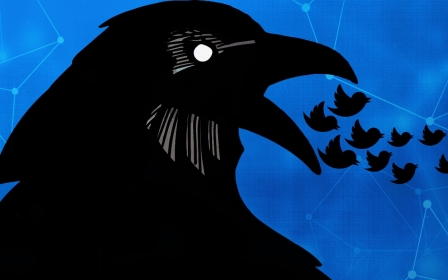Twitter and Facebook are no longer safe for us, say prominent Arab activists

A group of prominent Arab activists, artists and academics say they no longer view Twitter or Facebook as safe platforms, and they are calling on the social media companies to do more to protect them.
In an open letter released on Tuesday, nearly 40 signatories say the companies' policies - "or lack thereof" - have had "real life consequences on the lives of thousands of Arab voices".
"They have led to the arrest, enforced disappearance and at times the extrajudicial murder of innocent civilians in the Arab world, most notably, the Saudi journalist Jamal Khashoggi," the letter reads.
It was signed by London School of Economics professor Madawi al-Rasheed, Saudi filmmaker Safa al-Ahmad and Egyptian human rights advocate Mohammed Soltan, among others.
'Arab social media users no longer trust social media companies in protecting their personal data after they have witnessed increased investment from the authoritarian regimes'
- Letter signed by Arab activists, artists and academics
The signatories say they plan to form teams to protect social media users in the Arab world, and provide legal support to data breach victims and technical assistance to protect online privacy.
Stay informed with MEE's newsletters
Sign up to get the latest alerts, insights and analysis, starting with Turkey Unpacked
The letter comes weeks after two former Twitter employees were charged in a California federal court with spying for Saudi Arabia, and sharing user data with Saudi officials.
One of the employees accessed the data of more than 6,000 accounts over seven months before Twitter put him on administrative leave, according to a complaint filed by the US government in November.
Six months after the employee was put on administrative leave, Twitter CEO Jack Dorsey met with Saudi Crown Prince Mohammed bin Salman to reportedly discuss technology investment and how the two could cooperate to train Saudis.
Saudi activists recently told MEE that they have been left wondering if they are among the 6,000 users whose data was accessed, but they have not had any contact from the company.
They also said they fear that information, including IP addresses, may have been used to target and arrest activists who have subsequently disappeared. Twitter declined to answer MEE's specific questions about the alleged breach.
However, the signatories of Tuesday’s letter say they are not only focused on Twitter, the alleged Saudi spying or on privacy protection.
They also raised concerns about the other ways they say their speech has been compromised on social media platforms.
The social media accounts of "outspoken, anti-authoritarian Arab activists" have been shut down or suspended, and hashtags and trends have been manipulated through algorithms to "silence dissenting voices", they say in the letter.
They also say they are concerned by the investments authoritarian Middle Eastern governments have made in social media companies, "which has strengthened their position in silencing dissenting voices at home and abroad".
"Today, Arab social media users no longer trust social media companies in protecting their personal data after they have witnessed increased investment from the authoritarian regimes," the letter states.
It also calls on the companies to "step up and fulfill their moral and legal obligations" to protect user data and the lives of their users, and to re-evaluate and strengthen their policies.
A Twitter spokesperson told MEE that safety and privacy of people on the platform continues to be a top priority.
"We've expanded our safety policies, invested in proactive technology and tools, tightened enforcement, and improved how we communicate with people who use our service," she said.
She added that the company regularly discloses data related to state-backed operations identified on the service and publishes a report twice a year to detail work the company had undertaken, including platform manipulation and legal requests for user information.
This week, she said, the company launched a privacy centre to provide more clarity about what they are doing to protect the information people share with them.
MEE asked Facebook to comment on the letter, but did not receive a response.
This article is available in French on Middle East Eye French edition.
Middle East Eye delivers independent and unrivalled coverage and analysis of the Middle East, North Africa and beyond. To learn more about republishing this content and the associated fees, please fill out this form. More about MEE can be found here.





